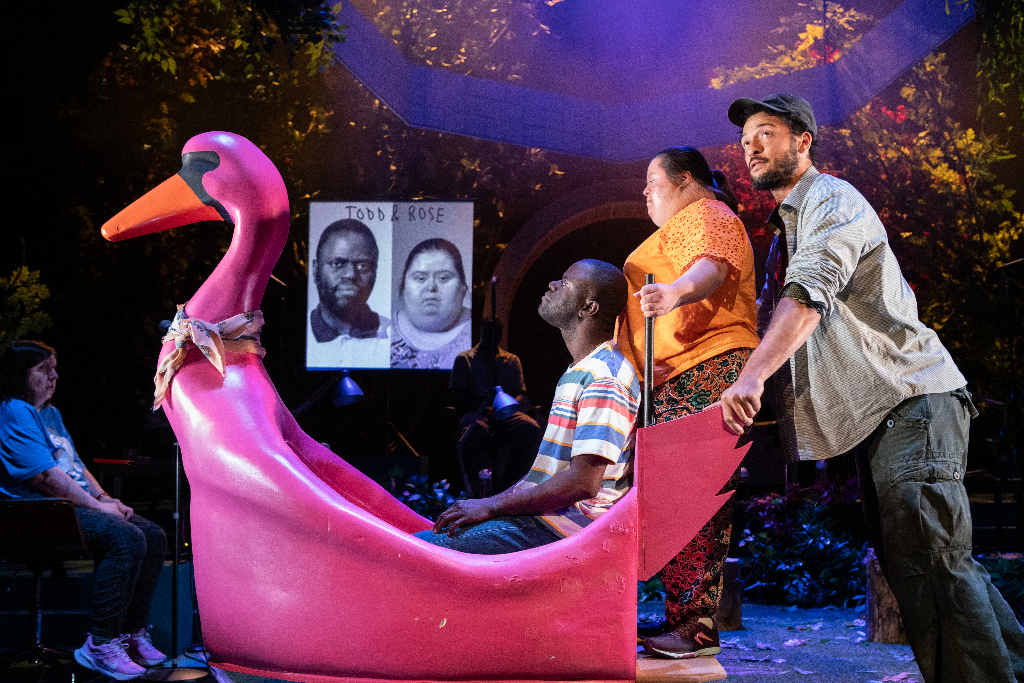The Royal Court’s collaboration with Access All Areas (AAA) may not be theatre’s first explicit embrace of the neurodiverse community on stage: Chickenshed has five decades of extraordinary inclusive work behind them and Jellyfish, starring Sarah Gordy at the National Theatre, was one of my highlights of 2019.
But Molly Davies's play, directed by Hamish Pirie, may be the most ambitious. Developed by AAA’s seven learning disabled and autistic Associate Artists, the five-year long project addresses many issues but sinks into a convoluted narrative that never quite resolves itself into plain sight. The ambition seems to have proved too much.
Its start is joyous. Kev (Housni Hassan (DJ)) whose smile conceals an inner pain, steps forward with Jake (Cian Binchy), a sardonic and witty commentator, to tell us that we’re not going to get the cabaret put on by learning disabled performers that "normals" so enjoy. That’s the first punch thrown at a word, indeed a concept, that gets a right working-over across 140 minutes or so. Moreover, they explain that it’s a relaxed performance, as is the case for the whole run, as an acknowledgement and unequivocal acceptance of the needs of the neurodiverse community in tonight (huge cheer!).  Soon we’re pitched into the show’s tricky structure. It’s explained that there has been a murder on a secret island in er… Battersea Park, and that the only way the seven strong group of friends can identify the killer and avoid all being called in by the police, is for them to re-enact the events leading to the death and for us "normals" to bear witness – the cops won’t believe them after all. Already the fourth wall has gone, the timeline has started to slip back and forth and the cast are playing themselves and their characters, sometimes in the same scene. It’s not easy to follow.
Soon we’re pitched into the show’s tricky structure. It’s explained that there has been a murder on a secret island in er… Battersea Park, and that the only way the seven strong group of friends can identify the killer and avoid all being called in by the police, is for them to re-enact the events leading to the death and for us "normals" to bear witness – the cops won’t believe them after all. Already the fourth wall has gone, the timeline has started to slip back and forth and the cast are playing themselves and their characters, sometimes in the same scene. It’s not easy to follow.
The deceased is Joe, played by Danny (Hamilton West End’s Jamael Westman, pictured above with Kirsty Adams, Dayo Koleosho and Stephanie Newman), a homeless young man recruited for the reconstruction. Joe was depressed, lonely and in need of a hug when, unexpectedly, he got one from Todd (an earnest Dayo Koleosho) and he follows him off the 22 bus to his acting class where he, a "normal", becomes the titular imposter.
The group react in different ways to Joe. Blossom (Kirsty Adams) is suspicious to the point of hostility, suspecting Joe wants to exploit them; Chloe (Charlene Salter) feels that her leadership of the group may be challenged and that its unique dynamic is destabilised by an uninvited interloper; Rose (Stephanie Newman, a wonderfully gifted comedian) just asks him to marry her; Geoff (Lee Phillips) observes carefully.
Plenty of themes are explored en route to the murder itself on the secret island. It’s heartbreaking to see Rose denied her right to express her sexuality by parents (understandably) protective of a vulnerable young adult – a key element of Jellyfish. We see how the well-meaning words and actions of Danny can only be received as condescending and how he himself reacts when the others leap to stereotyping of homeless people. One is also made aware of a Kafkaesque benefits system that dehumanises everyone involved, failing in the most basic of requirements which is to treat people with dignity.
Somehow, and the strands don’t always weave together as they might, it transpires that Joe was not killed by a punch and that a phone call from Chloe prompted him to call the Samaritans and step out of the lake. The previously terrifying police sirens can now be feared as they always have been by marginalised communities, as the group go back to their lives and their acting classes.
It’s something of an underwhelming conclusion to a play that is less than the sum of its parts. Having initially mocked the idea of a cabaret, the story unfolds episodically, each scene like an act on a bill designed to explore a different issue, a cabaret of a kind. It’s never clear whether the island, beautifully designed by Cai Dyfan, is a physical or psychological space, a safe haven for the soul, sure, but is it one that the group have carved out mentally or geographically? For the neurodiverse, perhaps those boundaries are less defined.
The show is bold, educational, full of winning performances and an important contribution to theatre’s responsibility to draw on and reflect the full panoply of the communities it serves. Thankfully, we’ve moved on, one hopes permanently, from Dustin Hoffman cosplaying an autistic adult in Rain Man, and the reaction in the house to key moments in the play irrefutably demonstrated that the audience were hearing and seeing things that they had wanted to hear and see for years.
It’s just a shame that the half decade of development work added so many layers of complication to the core story that it became as hard to discern as the island that may or may not have existed and the murder that definitely didn’t.















Add comment